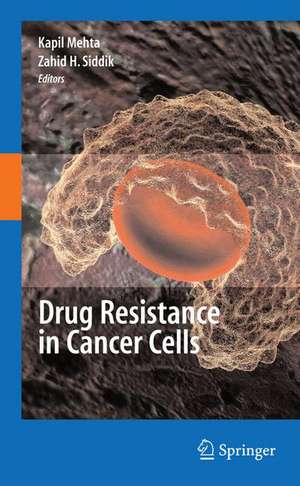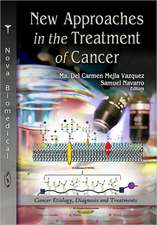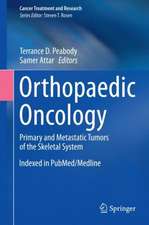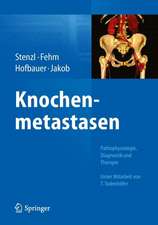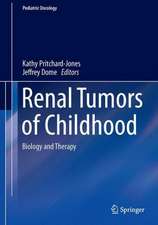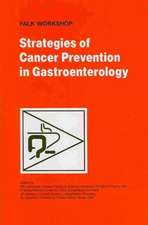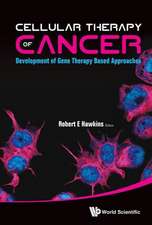Drug Resistance in Cancer Cells
Cuvânt înainte de Susan E. Bates Editat de Kapil Mehta, Zahid H. Siddiken Limba Engleză Hardback – 26 mai 2009
| Toate formatele și edițiile | Preț | Express |
|---|---|---|
| Paperback (1) | 1098.99 lei 6-8 săpt. | |
| Springer – 28 oct 2010 | 1098.99 lei 6-8 săpt. | |
| Hardback (1) | 1106.13 lei 6-8 săpt. | |
| Springer – 26 mai 2009 | 1106.13 lei 6-8 săpt. |
Preț: 1106.13 lei
Preț vechi: 1164.35 lei
-5% Nou
Puncte Express: 1659
Preț estimativ în valută:
211.72€ • 222.44$ • 177.93£
211.72€ • 222.44$ • 177.93£
Carte tipărită la comandă
Livrare economică 12-26 martie
Preluare comenzi: 021 569.72.76
Specificații
ISBN-13: 9780387894447
ISBN-10: 0387894446
Pagini: 363
Ilustrații: XVII, 363 p. 30 illus.
Dimensiuni: 155 x 235 x 22 mm
Greutate: 0.71 kg
Ediția:2009
Editura: Springer
Colecția Springer
Locul publicării:New York, NY, United States
ISBN-10: 0387894446
Pagini: 363
Ilustrații: XVII, 363 p. 30 illus.
Dimensiuni: 155 x 235 x 22 mm
Greutate: 0.71 kg
Ediția:2009
Editura: Springer
Colecția Springer
Locul publicării:New York, NY, United States
Public țintă
ResearchDescriere
It was estimated that in 2008, 1,437,180 patients would receive a new cancer diagnosisand 565,650individualswould die of cancer (Jemal et al. 2008).Since the vast majority of patients dying of cancer will have had anticancer therapy, both c- ventional chemotherapy and novel targeted therapy, it can be concluded that these patients are dying with drug resistant cancer. The term multidrug resistance is also apt – in that these patients die after having undergone multiple rounds of different and structurally unrelated cancer therapies. However, for some, the concept of m- tidrug resistance is a worn out idea, stemming from disappointment with the drug resistancereversalstrategiesthatwerecarriedoutinthe1990susingpumpinhibitors to block drug resistance mediated by P-glycoprotein, product of the MDR-1 gene. However, if one takes the larger de?nition – multidrug resistance as simultaneous resistance to multiple structurally unrelated anticancer therapies – its existence c- not be denied. The purpose of this book is to explore new concepts related to drug resistance in cancer, including resistance to the new molecularly targeted agents. Perhaps new terminology is needed for resistance that occurs following therapy with the targeted agents: Novel Targeted Agent Resistance (NTR). Alternatively, we can return to the original de?nition of multidrug resistance as simply the res- tance to multipleagents that occurs in the course of normalcancer progression.This resistance is likely to be mediated by many factors.
Cuprins
Chapter 1: Drug resistance in cancer cells: a historical perspective (Macus T. Kuo, Houston, TX) or Victor Ling (Toronto, Canada) Chapter 2: Metastasis and drug resistance (Kapil Mehta, Houston, TX) or (Isiah Fidler, Houston, TX) Chapter 3: Apoptosis/autophagy and drug resistance (R.S. Krebel, Ontario, Canada) or (Yasuko Kondo, Houston, TX) Chapter 4: Cytokines and drug resistance (Livio Mallucci, London, UK) Chapter 5: Tissue transglutaminase and drug resistance (KapilMehta, Houston, TX) Chapter 6: Integrin signaling and drug resistance (David Cheresh, San Diego, CA) Chapter 7: Oxidative stress and drug resistance Boldogh, Istvan, UTMB, Galveston, TX) Chapter 8: NF-k B and drug resistance (Bharat B. Aggarwal, Houston, TX) Chapter 9: p53 and chemoresistance (Zahid Siddik, Houston, TX) Chapter 10: Resistance to differentiation therapy (Bulent Ozoplat, Houston, TX) Chapter 11: Assessment of cancer drug resistance by nuclear imaging (Sunil Krishnan, Houston, TX) Chapter 12: Overcoming drug resistance by phytochemicals (Bharat B. Aggarwal. Houston, TX) or (Marion M Chan, Philadelphia, USA)
Textul de pe ultima copertă
An estimated 1.5 million patients in the United States are diagnosed with cancer every year and over half-a-million individuals die of the disease. Since the vast majority of the deaths occur after medical intervention with anticancer therapy, both conventional chemotherapy and novel targeted therapy, it can be concluded that these patients die from drug resistant cancers. A growing number of studies have revealed that mechanisms underlying the development of drug resistance in cancer cells are manifold and complex and very likely are dependent on cell and microenvironment context. In view of these facts, it is important to document the mechanisms of drug resistance and understand which are the dominant resistance pathways in a particular tumor type that could provide potential therapeutic targets in a clinical setting.
This book serves as a single source for the current knowledge on genetic and epigenetic alterations that contribute to the development of drug resistance. Comprehensive reviews written by renowned experts provide great insight on the current knowledge on drug resistance mechanisms. This book is a ready source of information to clinicians, cell and cancer biologists and defines molecular drug resistance mechanisms that are challenging scientists and clinical oncologists today.
About Editors:
Dr. Kapil Mehta is a Professor in the Department of Experimental Therapeutics, The University of Texas M. D Anderson Cancer Center, Houston, TX. He has published widely and received several patents on novel discoveries relating to drug resistance in the field of cancer therapeutics.
Dr. Zahid H. Siddik is also a Professor in the Department of Experimental Therapeutics at The University of Texas M.D. Anderson Cancer Center. He has studied extensively the mechanisms of drug action and resistance, and is recognized for his seminal studies with platinum-based antitumor agents.
This book serves as a single source for the current knowledge on genetic and epigenetic alterations that contribute to the development of drug resistance. Comprehensive reviews written by renowned experts provide great insight on the current knowledge on drug resistance mechanisms. This book is a ready source of information to clinicians, cell and cancer biologists and defines molecular drug resistance mechanisms that are challenging scientists and clinical oncologists today.
About Editors:
Dr. Kapil Mehta is a Professor in the Department of Experimental Therapeutics, The University of Texas M. D Anderson Cancer Center, Houston, TX. He has published widely and received several patents on novel discoveries relating to drug resistance in the field of cancer therapeutics.
Dr. Zahid H. Siddik is also a Professor in the Department of Experimental Therapeutics at The University of Texas M.D. Anderson Cancer Center. He has studied extensively the mechanisms of drug action and resistance, and is recognized for his seminal studies with platinum-based antitumor agents.
Caracteristici
Will serve as a single source for the current knowledge on genetic and epigenetic alterations that contribute to the development of drug resistance in cancer cells in form of comprehensive reviews by experts in the field
Includes supplementary material: sn.pub/extras
Includes supplementary material: sn.pub/extras
